#anastrozole side effects
Explore tagged Tumblr posts
Text
Best Beginner Steroid Cycle Guide | Safe & Effective Tips

Venturing into the world of anabolic steroids can be overwhelming, especially for first-time users. With countless options, stacks, and protocols available, it’s crucial to start on the right foot. If you’re looking for the best beginner steroid cycle, this guide will walk you through a safe, effective, and straightforward approach to help you maximize results while minimizing risks.
At Steropedia, we believe that education and preparation are key to a successful cycle. This article will cover the best compounds, dosage, cycle length, and post-cycle therapy (PCT) — tailored specifically for beginners.

Why Start With a Beginner-Friendly Cycle?
A beginner steroid cycle is designed to introduce your body to anabolic compounds in a controlled and manageable way. The goal is to gain muscle, increase strength, and improve recovery — without overwhelming your system or causing serious side effects.
Beginners often make the mistake of stacking multiple steroids or using high doses. This can lead to hormonal imbalances, unwanted side effects, and even long-term health issues. A basic, single-compound cycle is the most logical and safest way to begin your performance-enhancing journey.
Best Beginner Steroid Cycle: Testosterone-Only Cycle
For nearly every beginner, a Testosterone-only cycle is widely considered the best starting point. Testosterone is the primary male hormone and the foundation of almost every steroid stack. It’s well-researched, effective, and generally well-tolerated by healthy adults.
Cycle Structure:
Steroid: Testosterone Enanthate or Testosterone Cypionate
Dosage: 300–500 mg per week
Cycle Length: 10–12 weeks
Injection Frequency: Twice weekly (e.g., Monday & Thursday)
Both Enanthate and Cypionate are long-acting esters, which means they require fewer injections and maintain stable blood levels.
Why Testosterone Only?
Simplicity – Starting with one compound allows you to monitor how your body reacts without confusion from multiple substances.
Effectiveness – Testosterone supports muscle growth, strength gains, enhanced recovery, and increased libido.
Baseline Reaction – This first cycle helps establish how your body responds to hormones, which will guide your future cycles.
Optional: Aromatase Inhibitor (AI)
Testosterone can convert to estrogen in the body, which may cause water retention, gynecomastia (male breast tissue), or mood swings in some users.
Optional AI: Arimidex (Anastrozole)
Dosage: 0.25 mg every other day (only if symptoms occur)
Use only if necessary, as estrogen plays important roles in joint function and cholesterol health.
Post Cycle Therapy (PCT): The Key to Recovery
Once your cycle ends, your natural testosterone production will be suppressed. This is why PCT is essential to help your body recover its hormonal balance, maintain your gains, and avoid side effects like fatigue, mood changes, or libido loss.
PCT Protocol:
Start Time: 14 days after your last injection
Nolvadex (Tamoxifen): 40 mg/day for 2 weeks, then 20 mg/day for 2 weeks
OR
Clomid (Clomiphene): 50 mg/day for 4 weeks
Ensure your PCT products are pharmaceutical-grade or sourced from a trusted vendor.
Expected Results from a Beginner Cycle
When combined with a proper diet, consistent training, and quality sleep, beginners can expect impressive results:
Lean muscle gain: 10–20 lbs of muscle (some of which may be water weight)
Increased strength
Faster recovery
Improved gym performance
Keep in mind that lifestyle and genetics play a huge role in your results.
Essential Tips for a Successful Beginner Cycle
Get Pre-Cycle Blood Work Know your baseline hormone levels to track changes and spot potential issues.
Train Hard and Eat Smart Steroids enhance your gains, but they don’t replace hard work. Follow a structured training program and fuel your body with quality nutrients.
Hydrate and Support Liver Health Drink plenty of water and consider taking a liver support supplement, even with injectable compounds.
Avoid Alcohol and Recreational Drugs These can increase strain on your liver and affect your hormone levels.
Track Your Progress Keep a log of your workouts, weight, strength levels, and any side effects.
Use a Checklist Visit the Steroid Cycle Checklist to make sure you’re fully prepared and have everything you need before starting.
Common Side Effects and How to Manage Them
While a testosterone-only cycle is relatively safe for healthy adults, side effects can still occur. Watch for:
Acne or oily skin
Water retention
Increased aggression or mood swings
Temporary suppression of natural testosterone
Estrogen-related issues like gynecomastia
Most side effects can be managed through proper dosing, support supplements, and regular health checkups.
Final Thoughts
The best beginner steroid cycle is one that is simple, safe, and effective — and that’s exactly what a testosterone-only cycle provides. It lays the foundation for future success, helps you understand your body’s response, and minimizes unnecessary risks.
By starting slow and smart, you’ll build quality muscle, improve your physique, and protect your long-term health. Always back your cycle with solid training, clean nutrition, and thorough post-cycle therapy.
For a complete guide to preparing your first cycle, don’t forget to visit the Steropedia Steroid Cycle Checklist and set yourself up for success.
#Best steroid cycle for beginners#Best beginner steroid cycle#Steroid Cycle Checklist#Steroid cycle planner#Anabolic steroid cycle for beginners#Monitoring health on anabolic steroids#Best supplements for liver protection#Liver protection for steroid users#Kidney protection while on steroids#Safe supplementation during steroid cycles#Preventing abscesses while injecting steroids#How to calculate steroid dosage#Steroid cycle health monitoring#Best practices for injecting anabolic steroids#Blood sugar monitoring on steroids
0 notes
Text
Palbociclib: A Comprehensive Guide to Uses, Dosage, Side Effects & More
Palbociclib
Summary
Palbociclib (brand names: Ibrance, Palbonix, Palboxen, Palbocent) is an oral CDK4/6 inhibitor used to treat hormone receptor-positive (HR+), HER2-negative advanced or metastatic breast cancer. It works by blocking proteins that promote cancer cell growth, slowing tumor progression.
Available in 100mg and 125mg capsules, Palbociclib is typically combined with aromatase inhibitors (letrozole, anastrozole) or fulvestrant��for better efficacy. Common side effects include neutropenia, fatigue, nausea, and diarrhea.
This guide covers how Palbociclib works, dosage, side effects, drug interactions, safety precautions, and alternative brands to help patients and caregivers make informed decisions.
Introduction
Breast cancer remains one of the most prevalent cancers worldwide, with HR+/HER2- subtypes accounting for ~70% of cases. For patients with advanced or metastatic disease, Palbociclib has emerged as a breakthrough targeted therapy, significantly improving progression-free survival.
But how does it work? What are the side effects? And how long does it take to show results? This guide answers all key questions, ensuring you have accurate, up-to-date, and actionable information.
What is Palbociclib?
Palbociclib is a cyclin-dependent kinase (CDK) 4/6 inhibitor—a type of targeted cancer therapy. It blocks CDK4 and CDK6 proteins, which play a crucial role in cell division and cancer growth.
Key Facts:
Brand Names: Ibrance, Palbonix, Palboxen, Palbocent
Generic Availability: Yes (more affordable options available)
FDA Approval: 2015 for metastatic breast cancer 314
Therapeutic Class: Antineoplastic, Kinase Inhibitor

How Does Palbociclib Work? (Mechanism of Action)
Palbociclib targets CDK4/6, proteins that help cancer cells divide uncontrollably. By inhibiting these kinases: ✅ Slows cancer cell proliferation ✅ Delays tumor growth ✅ Enhances effectiveness of hormonal therapy
Why Combine with Aromatase Inhibitors?
Letrozole/Anastrozole reduce estrogen production.
Fulvestrant blocks estrogen receptors.
Palbociclib enhances their effect by preventing cancer cells from bypassing hormonal blockade 714.
Palbociclib FDA Approval & Prescribing Information
First approved in 2015 for HR+/HER2- metastatic breast cancer 14.
Standard dose: 125mg once daily for 21 days, followed by a 7-day break (28-day cycle).
Lower dose (100mg or 75mg) may be used if severe side effects occur 7.
Palbociclib Uses & Indications
Approved Uses:
✔ First-line therapy (with an aromatase inhibitor) for postmenopausal women/men with HR+/HER2- metastatic breast cancer. ✔ Second-line therapy (with fulvestrant) for patients whose cancer progressed after hormonal therapy 14.
Off-Label Uses (Under Research):
Liposarcoma
Glioblastoma
Other CDK4/6-dependent cancers
Dosage & Administration
Dosage FormStrengthRegimenPalbonix 125mg125mg21 days on, 7 days offPalbonix 100mg100mgAdjusted for toxicityPalboxen 125mg125mgWith food (capsules)
Key Notes:
Take with or without food (tablets) / with food (capsules).
Do not crush or chew—swallow whole.
If vomiting occurs, skip the dose—do not double dose 7.

Available Brands & Prices
BrandStrengthPrice (21 Capsules)Palbonix 125mg125mg~$310Palbonix 100mg100mg~$215Palboxen 125mg125mg~$70Palbocent 125mg125mg~$80
(Prices may vary based on location and pharmacy.)
Side Effects of Palbociclib
Common Side Effects:
Neutropenia (low white blood cells) – Most frequent 14.
Fatigue
Nausea & Diarrhea
Mouth sores
Serious Side Effects (Seek Medical Help):
⚠ Severe infections ⚠ Lung inflammation (pneumonitis) ⚠ Liver toxicity
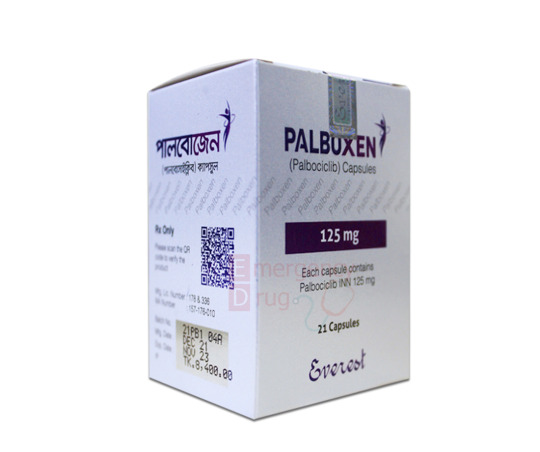
Drug Interactions & Precautions
Avoid These While Taking Palbociclib:
❌ Grapefruit (increases drug levels) ❌ Strong CYP3A inhibitors (ketoconazole, clarithromycin) ❌ Live vaccines (weakened immune system)
Precautions:
✔ Regular blood tests (monitor neutrophils). ✔ Avoid pregnancy (can harm fetus).
Pregnancy, Lactation & Pediatric Use
Pregnancy: Contraindicated (risk of fetal harm).
Breastfeeding: Not recommended (unknown if excreted in milk).
Pediatric Use: Not approved for children 14.
Safety Advice
Alcohol: May worsen fatigue.
Driving: Dizziness possible—use caution.
Kidney/Liver Impairment: Dose adjustments may be needed.
Storage Conditions
Room temperature (20°C–25°C).
Keep in original packaging.

What If You Miss a Dose?
Skip the missed dose.
Do NOT take extra to compensate.
Conclusion
Palbociclib is a game-changer for HR+/HER2- breast cancer, improving survival rates. While side effects like neutropenia are common, proper monitoring ensures safe and effective treatment.
For cost-effective options, generic Palbociclib (Palbonix, Palboxen, Palbocent) are available. Always consult your oncologist before making changes to your regimen.
FAQs (People Also Ask)
1. How long does Palbociclib take to work?
Most patients see tumor stabilization within 2-3 months, but individual responses vary.
2. What is the success rate of Palbociclib?
Studies show it extends progression-free survival by ~10-24 months when combined with hormonal therapy.
3. Can Palbociclib cure breast cancer?
No, but it effectively controls advanced/metastatic disease, improving quality of life.
4. Does Palbociclib cause hair loss?
Mild hair thinning may occur, but not severe alopecia like chemotherapy.
5. What is the best time to take Palbociclib?
Morning doses are common, but consistency (same time daily) matters most.
#emergencydrug#palbociclib#palboxen 125mg#Palbonix 125mg#Palbonix 100mg#Palbocent 125mg#Palbociclib side effects#Palbociclib prices#Palbociclib cost#Palbociclib medicines
0 notes
Text
Hormone Therapy for Breast Cancer
Breast cancer is one of the most common cancers affecting women globally. Among the many treatment options available, hormone therapy plays a crucial role—especially for patients diagnosed with hormone receptor-positive breast cancer. This type of treatment helps reduce the risk of cancer recurrence and significantly improves long-term outcomes. In this blog, we’ll explore how hormone therapy works, its various types, when it’s used, its benefits, side effects, and its preventive potential.
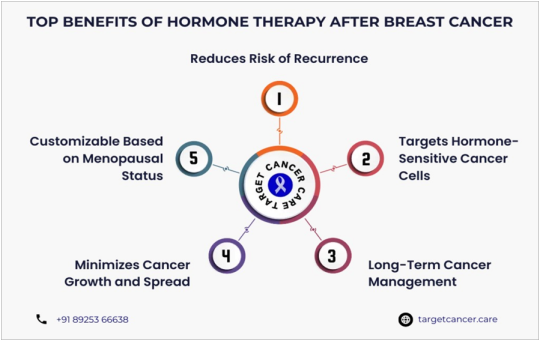
What Is Hormone Therapy for Breast Cancer?
Hormone therapy also called endocrine therapy is a treatment that targets hormone-sensitive breast cancer cells. It works by blocking or lowering the levels of estrogen and progesterone, two hormones that can stimulate the growth of some types of breast cancer. Unlike chemotherapy, which attacks all rapidly dividing cells, hormone therapy specifically targets cancer cells that depend on hormones to grow.
Understanding Hormones and Hormone Receptors
Hormones are chemicals produced by glands in the body that help regulate various functions. In some breast cancers, hormones like estrogen bind to hormone receptors on cancer cells and promote their growth.
In estrogen receptor-positive (ER+) breast cancer, the cancer cells have receptors that latch onto estrogen, encouraging the tumor to grow. Hormone therapy works by disrupting this connection either by blocking the receptors or reducing estrogen levels in the body.
How Does Hormone Therapy Work?
Hormone therapy helps to:
Block estrogen from attaching to cancer cells
Reduce the amount of estrogen produced in the body
Suppress ovarian function (in premenopausal women)
By cutting off the hormonal fuel supply to the cancer cells, this therapy helps slow or stop the cancer from growing and spreading.
Types of Hormone Therapy for Breast Cancer
1. Selective Estrogen Receptor Modulators (SERMs)
Examples: Tamoxifen, Toremifene These drugs bind to estrogen receptors on breast cells, blocking estrogen from promoting cancer growth. Tamoxifen is commonly used in both premenopausal and postmenopausal women.
2. Aromatase Inhibitors (AIs)
Examples: Anastrozole (Arimidex), Letrozole (Femara), Exemestane (Aromasin) These drugs lower estrogen levels by blocking the aromatase enzyme, which is responsible for estrogen production in postmenopausal women. AIs are often used after surgery and in advanced cases.
3. Ovarian Suppression
Used primarily in premenopausal women to stop the ovaries from producing estrogen. Methods include:
Medications (e.g., Goserelin)
Surgical removal of the ovaries (oophorectomy)
Ovarian suppression may be used alone or combined with other hormone therapies for better results.
When Is Hormone Therapy Used?
Hormone therapy is recommended in the following situations:
● Early-Stage Breast Cancer
After surgery, hormone therapy is used to reduce the risk of recurrence, especially in ER+ cases.
● Advanced or Metastatic Breast Cancer
It helps control the spread and progression of cancer that has extended beyond the breast and lymph nodes.
● Preventive Therapy
In women at high risk of developing breast cancer (e.g., due to family history or BRCA gene mutations), hormone therapy can lower the risk.
● Post-Treatment Maintenance
Hormone therapy is often continued for 5–10 years after initial treatment to suppress any remaining cancer cells and prevent relapse.
Can Hormone Therapy Prevent Breast Cancer?
Yes. Hormone therapy is sometimes used proactively in women with a high risk of developing hormone-sensitive breast cancer.
Preventive Drugs Include:
Tamoxifen: Blocks estrogen in breast cells; also acts like estrogen in bones and uterus.
Raloxifene: Mainly used in postmenopausal women for prevention.
Aromatase Inhibitors: Prevent estrogen production in postmenopausal women.
These medications can significantly reduce the chances of developing ER+ breast cancer.
Effectiveness and Success Rate
Hormone therapy is highly effective for ER+ breast cancer:
Reduces recurrence by 40–50% in early-stage patients.
Improves overall survival when used in combination with other treatments.
Delays disease progression in advanced or metastatic cases.
These results underline its importance in a comprehensive breast cancer treatment plan.
Benefits of Hormone Therapy for Breast Cancer
Lowers the Risk of Recurrence Reduces the likelihood of cancer coming back after treatment.
Prevents Cancer Spread Slows or stops the spread of cancer to other organs.
Improves Survival Rates Enhances the effect of other treatments and boosts long-term outcomes.
Non-Invasive Option Administered as a pill or injection, making it convenient and manageable.
Side Effects of Hormone Therapy
While hormone therapy is generally well-tolerated, it may cause side effects, including:
Hot flashes
Joint pain or stiffness
Bone thinning or osteoporosis (especially with AIs)
Mood swings or depression
Vaginal dryness or discomfort
Discussing these potential effects with your doctor will help in managing them better during the treatment course.
Risks of Hormone Therapy
Like any treatment, hormone therapy carries certain risks:
Tamoxifen: May increase the risk of uterine cancer and blood clots.
Aromatase Inhibitors: Can lead to bone loss and increase the risk of fractures.
Ovarian Suppression: Can cause menopausal symptoms like night sweats and mood changes.
Regular follow-ups and monitoring can help manage these risks effectively.
Conclusion
Hormone therapy for breast cancer remains a cornerstone treatment for hormone receptor-positive cases. It offers significant benefits in reducing cancer recurrence, controlling disease progression, and improving survival rates. While there are potential side effects and risks, they can often be managed under medical guidance. For patients with ER+ breast cancer, hormone therapy provides long-term protection and hope for a healthy future. For more details , https://targetcancer.care/hormone-therapy-for-breast-cancer/
0 notes
Text
Buy Anastrozole
Considering buying anastrozole? This aromatase inhibitor is primarily used for treating estrogen receptor-positive breast cancer in postmenopausal women. Anastrozole effectively lowers estrogen levels, which is crucial for managing hormone-sensitive tumors. Additionally, it can help men with gynecomastia and is popular among bodybuilders for managing estrogenic side effects. Ensure safe purchasing by consulting with a healthcare provider and selecting reputable pharmacies. By understanding anastrozole's benefits and potential side effects, you can make informed decisions about your health.
#Understanding Anabolic Steroids#The Science Behind Steroid Use#Steroids vs. Natural Supplements#Benefits of Testosterone Therapy#How Steroids Affect Muscle Growth#Safe Steroid Use for Bodybuilders#Steroid Cycles Explained#Common Myths About Steroids#Steroids and Athletic Performance#The Role of Steroids in Recovery#Legal Alternatives to Anabolic Steroids#Steroid Side Effects: What to Expect#Post Cycle Therapy (PCT) Essentials#How to Choose the Right Steroid#Understanding Corticosteroids#Best Practices for Steroid Stacking#The Impact of Steroids on Hormones#Anabolic Steroids for Women#How to Minimize Steroid Side Effects#The History of Steroid Use in Sports#Comparing Different Types of Anabolic Steroids#Steroid Regulations and Legal Issues#The Effects of Steroids on Mental Health#Nutrition Tips for Steroid Users#How to Spot Fake Steroids#Steroids and Weight Loss: The Truth#The Benefits of SARMs vs. Steroids#Steroids in the Bodybuilding Community#My Experience with Steroids: A Personal Journey#Understanding Steroid Addiction
0 notes
Text
The Role of Hormone Therapy in Breast Cancer Treatment Explained By The Breast Cancer Specialist In Surat
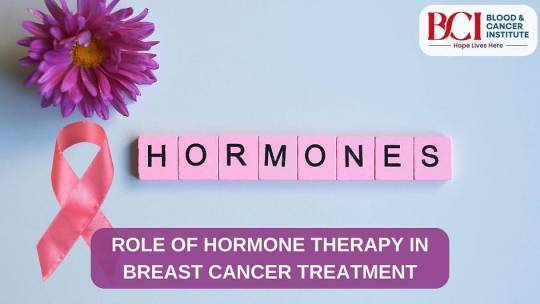
Breast cancer remains one of the most prevalent forms of cancer affecting women worldwide. As medical science advances, treatment options continue to evolve, offering patients better chances of survival and improved quality of life. Among these treatment modalities, hormone therapy has emerged as a crucial component in the fight against breast cancer. This blog post from our breast cancer specialists in Surat at BCI- Blood and Cancer Institute, is about the significant role that hormone therapy plays in breast cancer treatment, exploring its mechanisms, applications, and impact on patient outcomes.
Understanding Hormone-Responsive Breast Cancer
Not all breast cancers are the same. A significant proportion of breast cancers are hormone-responsive, meaning their growth is fueled by hormones such as estrogen and progesterone. These cancers are often referred to as estrogen receptor-positive (ER+) or progesterone receptor-positive (PR+) breast cancers.
In hormone-responsive breast cancers, the cancer cells have receptors that bind to estrogen or progesterone, stimulating their growth and proliferation. Cancer specialists in Surat, and worldwide, use this understanding for targeted treatments that aim to disrupt this hormone-dependent growth cycle.
The Mechanism of Hormone Therapy
Hormone therapy, also known as endocrine therapy, works by interfering with the body’s hormone production or by blocking the effects of hormones on breast cancer cells. The primary goal is to deprive the cancer cells of the hormones they need to grow and spread. This can be achieved through various approaches:
Selective Estrogen Receptor Modulators (SERMs): These drugs, such as tamoxifen, work by binding to estrogen receptors in breast tissue, effectively blocking estrogen from attaching to these receptors.
Aromatase Inhibitors (AIs): In postmenopausal women, AIs like letrozole, anastrozole, and exemestane work by reducing the amount of estrogen produced in the body by blocking the enzyme aromatase, which is responsible for converting androgens into estrogen.
Estrogen Receptor Downregulators: Drugs like fulvestrant not only block estrogen receptors but also cause the receptors to be destroyed, further reducing the cancer cells’ ability to respond to estrogen.
Ovarian Suppression: In premenopausal women, medications or surgical procedures can be used to stop the ovaries from producing hormones, effectively inducing menopause.
Applications of Hormone Therapy
Hormone therapy finds application at various stages of breast cancer treatment in Surat:
Adjuvant Therapy: After primary treatments like surgery, radiation, or chemotherapy, hormone therapy is often prescribed to reduce the risk of cancer recurrence. This can be a long-term treatment, often lasting 5–10 years.
Neoadjuvant Therapy: In some cases, hormone therapy may be used before surgery to shrink tumors, making them easier to remove and potentially allowing for breast-conserving surgery.
Metastatic Breast Cancer Treatment: For patients with advanced or metastatic hormone-responsive breast cancer, hormone therapy can be an effective way to control the disease, often with fewer side effects than traditional chemotherapy.
Preventive Therapy: In high-risk individuals, certain hormone therapies have shown promise in reducing the risk of developing breast cancer.
Benefits and Considerations
The benefits of hormone therapy in breast cancer treatment are substantial:
● Improved Survival Rates: Studies have shown that hormone therapy can significantly reduce the risk of cancer recurrence and improve overall survival rates in patients with hormone-responsive breast cancers.
● Quality of Life: Compared to chemotherapy, hormone therapy often has fewer and less severe side effects, allowing patients to maintain a better quality of life during treatment.
● Long-term Protection: The protective effects of hormone therapy can extend for many years after the completion of treatment.
However, it’s important to consider that hormone therapy is not without its challenges:
● Side Effects: While generally milder than chemotherapy, hormone therapy can cause side effects such as hot flashes, joint pain, and increased risk of osteoporosis.
● Resistance: Some cancers may develop resistance to hormone therapy over time, necessitating changes in treatment approach.
● Patient Adherence: The long-term nature of hormone therapy can be challenging for some patients, affecting adherence to treatment plans.
Personalized Approach
According to the experts of Blood and Cancer Institute, one of the best cancer hospitals in Surat, the field of breast cancer treatment is moving towards increasingly personalized approaches. Factors such as the specific type of breast cancer, the patient’s menopausal status, and individual risk factors all play a role in determining the most appropriate hormone therapy regimen.
Genomic testing has further refined this approach, allowing oncologists to identify patients who are most likely to benefit from hormone therapy and those who might safely forego it, avoiding unnecessary treatment and potential side effects.
Conclusion
Hormone therapy has revolutionized the treatment of hormone-responsive breast cancers, offering patients a targeted, effective, and often less toxic treatment option. As research continues, we can expect further refinements in hormone therapy approaches, leading to even better outcomes for breast cancer patients.
The role of hormone therapy in breast cancer treatment underscores the importance of personalized medicine and the power of understanding the underlying biology of cancer. As we continue to unravel the complexities of breast cancer, hormone therapy stands as a testament to the progress made in cancer treatment and the hope it brings to millions of patients worldwide.
0 notes
Text
Generic Arimidex
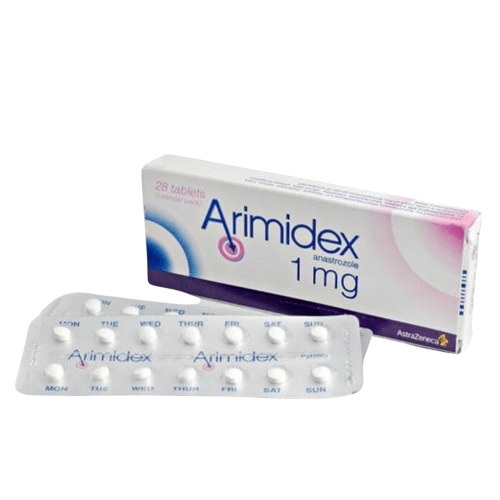
Arimidex is a brand name for anastrozole, a medication primarily used to treat breast cancer in postmenopausal women. It is a type of drug called an aromatase inhibitor, which works by reducing estrogen levels in the body. Since many breast cancers are estrogen-sensitive, lowering estrogen can help slow or stop the growth of these cancers. Here is a detailed breakdown of the generic drug anastrozole (Arimidex):
Mechanism of Action
Anastrozole works by inhibiting the enzyme aromatase, which is responsible for converting androgens (male hormones) into estrogens (female hormones) in the body. Since many breast cancers grow in response to estrogen, reducing the amount of estrogen in the body can help shrink or slow the growth of the tumor.
Uses
Breast Cancer Treatment: Mainly used for treating hormone receptor-positive breast cancer in postmenopausal women.
Prevention of Cancer Recurrence: Helps reduce the risk of breast cancer recurrence after surgery.
Occasional Off-Label Uses: May sometimes be prescribed for ovarian cancer or as part of treatment for infertility in some cases.
Side Effects
Common side effects of anastrozole include:
Hot flashes
Joint pain (arthralgia)
Osteoporosis: As estrogen helps maintain bone density, its reduction can increase the risk of bone thinning and fractures.
Fatigue
Nausea
Mood changes or depression
Increased cholesterol levels
Less common but serious side effects:
Heart disease or cardiovascular issues: Some studies have shown an increased risk of heart disease, particularly in women with pre-existing risk factors.
Liver function issues: In rare cases, anastrozole can cause liver enzyme elevations.
Severe allergic reactions: Rash, hives, and swelling (rare).
Contraindications
Pre-menopausal women: Not recommended for women who have not yet gone through menopause.
Pregnancy and Breastfeeding: Anastrozole can harm a developing fetus and is not recommended during pregnancy or while breastfeeding.
Severe liver or kidney disease: Requires caution in patients with significant liver or kidney impairment.
0 notes
Text
Advanced Treatments for Breast Cancer: What You Need to Know

Breast cancer treatment has evolved significantly, offering a range of advanced options designed to target the disease more effectively and with fewer side effects. If you or someone you know is facing a breast cancer diagnosis, understanding these treatments can help make informed decisions. Here’s a comprehensive guide to the latest advanced treatments available.
1. Targeted Therapy
Targeted therapy is a sophisticated treatment that focuses on specific molecules involved in cancer growth. Unlike traditional chemotherapy, which affects all rapidly dividing cells, targeted therapy zeroes in on cancer cells, minimizing damage to healthy cells. This approach can reduce side effects and enhance treatment effectiveness.
HER2 Inhibitors: For cancers that overexpress the HER2 protein, drugs like trastuzumab (Herceptin) and pertuzumab (Perjeta) are used. These drugs block the HER2 growth factor, slowing or stopping cancer progression.
CDK4/6 Inhibitors: Drugs such as palbociclib (Ibrance) target proteins that help cancer cells divide. This treatment is especially useful for hormone receptor-positive breast cancers, helping to control tumor growth.
2. Immunotherapy
Immunotherapy helps the body's immune system fight cancer by boosting or modifying its natural ability to recognize and destroy cancer cells. This approach has shown promise in treating various cancers, including breast cancer.
Checkpoint Inhibitors: These drugs block proteins that prevent immune cells from attacking cancer cells. Pembrolizumab (Keytruda) is one such drug that has been used to treat certain types of breast cancer.
Cancer Vaccines: Though still largely experimental, cancer vaccines aim to stimulate the immune system to target specific cancer cells. Research continues to advance these therapies, making them a potential future treatment option.
3. Hormone (Endocrine) Therapy
Hormone therapy is used for breast cancers that are hormone receptor-positive, meaning they grow in response to hormones like estrogen or progesterone. This treatment works by blocking the effects of these hormones or lowering their levels in the body.
Selective Estrogen Receptor Modulators (SERMs): Tamoxifen is a well-known SERM that binds to estrogen receptors, preventing estrogen from fueling cancer growth.
Aromatase Inhibitors: Drugs like anastrozole (Arimidex) and letrozole (Femara) lower estrogen levels by inhibiting the aromatase enzyme, which is responsible for estrogen production in postmenopausal women.
4. Chemotherapy
Chemotherapy remains an important option for treating breast cancer, especially when other treatments are not enough. It uses powerful drugs to kill rapidly dividing cancer cells. Modern approaches include:
Neoadjuvant Chemotherapy: Administered before surgery, this treatment shrinks tumors, making them easier to remove.
Adjuvant Chemotherapy: Given after surgery, this treatment aims to eliminate any remaining cancer cells and reduce the risk of recurrence.
5. Personalized Medicine
Personalized medicine tailors treatment to the individual characteristics of each patient’s cancer. This approach involves analyzing genetic mutations and markers specific to the cancer to select the most effective therapies.
Genomic Testing: Helps doctors understand the genetic changes driving cancer, allowing them to choose targeted treatments that are more likely to work for the specific type of cancer.
6. Radiation Therapy
Radiation therapy uses high-energy rays to target and kill cancer cells. It is often used after surgery to remove any remaining cancer cells in the breast, chest wall, or underarm area. New techniques such as intensity-modulated radiation therapy (IMRT) offer more precise targeting, reducing side effects and improving treatment outcomes.
7. Surgery
Surgical options for breast cancer have also advanced, offering less invasive choices and better recovery outcomes:
Lumpectomy: This procedure involves removing the tumor and a small margin of surrounding tissue. It is often followed by radiation therapy to ensure all cancer cells are eliminated.
Mastectomy: Involves removing one or both breasts. Advances in reconstructive surgery can help restore appearance and improve recovery.
8. Clinical Trials
Participating in clinical trials can provide access to the latest treatments and contribute to medical research. Clinical trials test new therapies and approaches, which may offer additional options not yet available outside of a research setting. Discussing clinical trial options with your healthcare team can provide more choices.
Conclusion
Advanced treatments for breast cancer offer new hope and improved outcomes for many patients. From targeted therapies and immunotherapy to personalized medicine and advanced surgical options, these treatments are designed to tackle cancer more effectively and with fewer side effects. For those seeking the best breast cancer treatment in Hyderabad, Dr. Chinnababu Sunkavalli is a top choice. Known for his extensive experience and advanced treatment methods, he provides expert care tailored to each patient’s needs.
Contact Dr. Chinnababu Sunkavalli today to explore the best breast cancer treatment options in Hyderabad and take the next step towards effective care.
#Best Robotic Surgical Oncologist in Hyderabad#Dr Chinnababu Sunkavalli Best Robotic Surgical Oncologist in Hyderabad#Best Oncology Specialist in Hyderabad#Breast Cancer Treatment in Hyderabad#Best Breast Cancer Treatment in Hyderabad#Best Surgical Oncologist in Hyderabad#Surgical Oncologist in Hyderabad#Oncologist in Hyderabad#Oncologist Hyderabad#Top Oncologist in Hyderabad#Top 10 Oncologists in Hyderabad#Oncologist
0 notes
Text
Take Anastrozole Tablets to Avoid Androgenic Side Effects

The Anastrozole tablets are not like steroids but rather medicines to counter some serious health conditions. This medicine is called Anastrozole Online, which is very effective after bodybuilding. This medicine works well against steroids, which are prone to aromatization. When estrogen and androgen are not balanced in the right way, steroid users experience gynecomastia, water retention, acne, and other negative side effects. The Anastrozole tablets stop the conversion of testosterone into estrogen, thus preventing some serious side effects.

Shopping for Anastrozole online has always been challenging. British Dragon Pharmaceuticals guarantees high-quality Anastrozole Tablets that meet rigorous purity and potency standards. Whether you are a seasoned athlete or new to PCT, these tablets offer reliable support for your post-cycle needs. By integrating this steroid into your regimen, you can confidently navigate the challenges of post-cycle therapy. Do not wait; buy Anastrozole Tablets today and experience the benefits of advanced estrogen management. For more details click:
https://axsteroids.com/post-cycle-therapy-2114/anastrozole-tablets-49020.html
#Anastrozole Tablets#Buy Anastrozole Tablets#Anastrozole Online#Post Cycle Therapy#PCT#British Dragon Pharmaceuticals
0 notes
Text
Anastrozole (Arimidex) – an aromatase inhibitor for the adjuvant setting?
The development of new aromatase inhibitors such as anastrozole represents a significant step forward in the clinical management of postmenopausal women with hormone-sensitive breast cancers. The evidence in support of anastrozole – a non-steroidal, orally administered aromatase inhibitor – as an effective antitumour agent is outlined here.
Anastrozole was one of the first agents to move immediately from phase I studies of clinical pharmacology into clinically evaluable phase III trials, due primarily to its proven effectiveness in reducing plasma oestrogen, a recognized surrogate marker for anti-aromatase activity. Large-scale trials have now shown that anastrozole shows significant benefits over established endocrine agents in both first- and second-line management of advanced breast cancer. Consequently, anastrozole is an effective alternative to tamoxifen for first-line treatment of advanced disease in postmenopausal women and is now available for such use in a number of different countries. Given this superior efficacy profile in the management of advanced disease, anastrozole may also provide advantages in early disease therapy, where long-term treatment may be required to prevent disease recurrence.
Since its introduction in 1973, tamoxifen has remained the endocrine therapy of choice for early breast cancer in postmenopausal patients (Early Breast Cancer Trialists’ Collaborative Group, 1992, 1998) and has provided clinicians with an effective and well tolerated treatment. However, tamoxifen has a number of limitations, based primarily on its partial oestrogen agonist activity, which contribute directly to endometrial cell proliferation and rarely endometrial cancer (Fisher et al, 1998) and breast tumour stimulation. In contrast, aromatase inhibitors act by suppressing conversion of androgen substrates into oestrogen (the primary source of oestrogen in postmenopausal women), thereby reducing the incidence of the more serious side-effects associated with tamoxifen while maintaining efficacy for the management of hormone-sensitive breast cancer. Primary prerequisites for effective alternative agents in the adjuvant or preventative settings include equivalent or superior efficacy and/or improved tolerability compared with tamoxifen, together with easy and convenient administration. Tolerability assumes a much greater importance in the adjuvant setting, where prolonged thera
0 notes
Text
Understanding the Importance of Post Cycle Therapy Medicines in Optimizing Hormonal Balance
Body:
Hormonal Imbalance and Its Consequences: Anabolic steroid cycles can disrupt the body's natural hormonal balance. During a cycle, post cycle therapy medicines the body experiences an increase in testosterone levels, but as the cycle concludes, the body's natural production of testosterone may decrease significantly. This hormonal imbalance can lead to a range of undesirable side effects such as mood swings, fatigue, decreased libido, and muscle loss.
Purpose of Post Cycle Therapy (PCT): Post Cycle Therapy aims to restore the body's hormonal balance by stimulating the production of endogenous testosterone. PCT is typically initiated after the cessation of a performance-enhancing substance cycle to counteract the negative effects and help the body recover more effectively.
Commonly Used PCT Medicines: a. Selective Estrogen Receptor Modulators (SERMs): Medications like Clomiphene (Clomid) and Tamoxifen (Nolvadex) are commonly used SERMs in PCT. They work by blocking estrogen receptors, preventing the negative feedback loop that inhibits testosterone production.
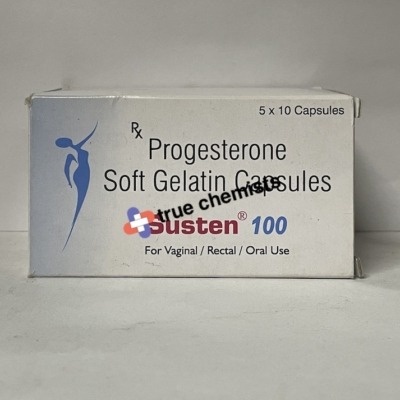
Aromatase Inhibitors (AIs): AIs, such as Anastrozole and Exemestane, target the aromatase enzyme responsible for converting excess testosterone into estrogen. By inhibiting this process, AIs help maintain a more favorable testosterone to estrogen ratio.
Human Chorionic Gonadotropin (hCG): Administered during PCT, hCG mimics the action of luteinizing hormone (LH), stimulating the testes to produce more testosterone. This aids in a smoother transition during the post-cycle period.
Timing and Duration of PCT: Initiating PCT at the right time is crucial. Generally, it starts a few days after the last administration of performance-enhancing substances. The duration of PCT varies but typically lasts several weeks, Buy Careprost 0.03% Eye Drops 3ml allowing the body sufficient time to regain its natural hormonal balance.
Monitoring and Individualization: Individual response to PCT can vary, making monitoring an essential aspect of the process. Regular blood tests, including testosterone and estrogen levels, help tailor PCT protocols to individual needs, ensuring a more effective and personalized approach.
0 notes
Text
A Surgeon and Breast Cancer Survivor's Take on Preventative Medication Side Effects
Breast cancer surgeon, Dr. Liz O’Riordan discusses her journey on Anastrozole. https://www.telegraph.co.uk/health-fitness/conditions/cancer/im-a-breast-cancer-surgeon-and-survivor-new-drug/

View On WordPress
0 notes
Text
The Path to Parenthood: Fertility Drugs for Men
Introduction
Parenthood is a cherished dream for many couples, but for some, it remains elusive due to infertility issues. While fertility concerns are often associated with women, it’s essential to recognize that men can also experience fertility challenges. Fertility drugs for men have emerged as a promising solution to address male infertility. In this article, we will explore the various aspects of male fertility drugs, their mechanisms, effectiveness, and potential side effects, shedding light on the hope they offer to couples aspiring to become parents.
Understanding Male Infertility
Male infertility is a complex issue that can be caused by various factors. These may include:
Low sperm count: A low sperm count, also known as oligospermia, is a common cause of male infertility. It decreases the chances of fertilization since there are fewer sperm available for the journey to meet the egg.
Poor sperm motility: Sperm motility refers to the ability of sperm to swim effectively. Reduced motility makes it challenging for sperm to reach and penetrate the egg.
Abnormal sperm morphology: The shape and structure of sperm play a vital role in fertilization. Sperm with irregular morphology may struggle to fertilize an egg.
Hormonal imbalances: Hormones such as testosterone, follicle-stimulating hormone (FSH), and luteinizing hormone (LH) regulate sperm production. Imbalances in these hormones can affect sperm production.
Erectile dysfunction: In some cases, difficulty in achieving or maintaining an erection can hinder the ability to ejaculate and, consequently, fertility.
Obstructive problems: Obstructions in the male reproductive system can prevent sperm from being ejaculated.

Fertility Drugs for Men
Male fertility drugs are designed to address the specific issues related to male infertility. These drugs work by targeting the underlying causes and enhancing sperm production, motility, or function. Here are some commonly prescribed fertility drugs for men:
Clomiphene Citrate: Clomiphene citrate is an anti-estrogen medication that can stimulate the pituitary gland to produce more FSH and LH. These hormones, in turn, promote sperm production. Clomiphene is typically prescribed for men with low sperm counts or poor sperm motility due to hormonal imbalances.
Human Chorionic Gonadotropin (HCG): HCG is a hormone that stimulates the testes to produce more testosterone. This hormone can be used to boost sperm production, particularly in men with low testosterone levels.
Human Menopausal Gonadotropin (hMG): hMG is a combination of FSH and LH, and it can be administered to stimulate sperm production. This treatment is often recommended for men with hormonal imbalances or those who have not responded well to other treatments.
Anastrozole: Anastrozole is an aromatase inhibitor that can help reduce estrogen levels in men. Elevated estrogen levels can negatively impact sperm production, and by lowering estrogen, Anastrozole can improve sperm count and motility.
Bromocriptine: Bromocriptine is a medication that can reduce levels of prolactin, a hormone that, when elevated, can impair sperm production. It is typically prescribed for men with hyperprolactinemia.
Effectiveness of Male Fertility Drugs
The effectiveness of male fertility drugs varies depending on the underlying causes of infertility and individual factors. These drugs can be highly successful in addressing hormonal imbalances and increasing sperm production. However, their efficacy may be limited in cases of severe structural or genetic issues.
Clomiphene citrate, for instance, has shown promise in increasing sperm counts and motility in men with low hormone levels. Human Chorionic Gonadotropin and Human Menopausal Gonadotropin have been successful in stimulating the testes to produce more sperm when hormonal imbalances are at the root of the problem.
While these drugs offer hope to many men, it is crucial to consult a healthcare professional before starting any fertility treatment. A comprehensive evaluation of the specific infertility issues is necessary to determine the most appropriate treatment approach.
Potential Side Effects
As with any medication, male fertility drugs can have side effects. It is essential to be aware of these potential drawbacks and discuss them with a healthcare provider. Some common side effects associated with male fertility drugs include:
Mood swings and emotional changes
Acne
Weight gain
Breast tenderness or enlargement (gynecomastia)
Headaches
Hot flashes
Allergic reactions in rare cases
The severity and prevalence of these side effects can vary from one individual to another. It is important to weigh the potential side effects against the benefits when considering male fertility drug treatment.
Lifestyle Changes and Male Fertility
In addition to medication, lifestyle modifications can significantly impact male fertility. It’s essential for men to adopt healthy habits that promote optimal sperm production and function. These lifestyle changes may include:
Diet: A balanced diet rich in essential nutrients like zinc, selenium, and antioxidants can support sperm health.
Exercise: Regular physical activity can help maintain a healthy body weight and hormone balance.
Stress management: Reducing stress through relaxation techniques like yoga or meditation can positively influence fertility.
Avoiding excessive heat: Prolonged exposure to heat, such as hot tubs or laptops on the lap, can impair sperm production. Avoiding excessive heat sources is important. Alcohol and tobacco: Reducing or eliminating alcohol and tobacco consumption can have a positive impact on sperm quality.
Conclusion
Male infertility can be a challenging issue, but fertility drugs offer hope for couples seeking toovercome this obstacle on their path to parenthood. These medications, such as Clomiphene Citrate, hCG, hMG, Anastrozole, and Bromocriptine, target the specific causes of male infertility, ranging from hormonal imbalances to sperm production issues. While they have shown success in many cases, it is essential to consult with a healthcare professional to determine the most suitable treatment plan.
However, fertility drugs are not a one-size-fits-all solution, and their effectiveness can vary depending on the individual and the underlying causes of infertility. It is crucial for men to be aware of potential side effects and to consider lifestyle changes that can improve their chances of successful fertility treatment.
In conclusion, male fertility drugs offer a ray of hope to couples facing infertility, giving them the opportunity to realize their dreams of parenthood. Through a combination of medical intervention and healthy living, men can take active steps to address their fertility issues and work towards the shared goal of bringing a child into their lives.
Source: https://digiexpertzz.com/the-path-to-parenthood-fertility-drugs-for-men/
0 notes
Text
Buy-Anabolic is the Best Online Retailer to Buy Arimiplex
Arimiplex is a well-known name in the field of bodybuilding. The compound name of Arimidex is Anastrozole, which is aromatase inhibitor used by professional bodybuilder to control the level of estrogen when they are running another steroid cycle. By inhibiting the aromatase enzyme, it prevents the conversion of testosterone to estrogen. It assists in preventing a variety of negative side effects brought on by high estrogen levels, including gynecomastia. Arimiplex works by stopping testosterone turn into estrogen. When you take a testosterone-based steroid, the natural testosterone productions gets lowered, and the excess exogenous testosterone changes into estrogen – resulting into excessive estrogen and then problems like gynecomastia. As an inhibitor, Arimidex prevents the harmful activity of your aromatase enzymes by blocking them. Simply put, it joins the enzymatic process itself, preventing the enzyme from converting testosterone by connecting to it. To buy Arimiplex, you can visit Buy-Anabolic, which is a trusted anabolic store for genuine products. To learn more about Arimiplex, visit - https://bit.ly/46Fwupa
0 notes
Text
Generic Arimidex
Arimidex is a brand name for anastrozole, a medication primarily used to treat breast cancer in postmenopausal women. It is a type of drug called an aromatase inhibitor, which works by reducing estrogen levels in the body. Since many breast cancers are estrogen-sensitive, lowering estrogen can help slow or stop the growth of these cancers. Here is a detailed breakdown of the generic drug anastrozole (Arimidex):
Mechanism of Action
Anastrozole works by inhibiting the enzyme aromatase, which is responsible for converting androgens (male hormones) into estrogens (female hormones) in the body. Since many breast cancers grow in response to estrogen, reducing the amount of estrogen in the body can help shrink or slow the growth of the tumor.
Uses
Breast Cancer Treatment: Mainly used for treating hormone receptor-positive breast cancer in postmenopausal women.
Prevention of Cancer Recurrence: Helps reduce the risk of breast cancer recurrence after surgery.
Occasional Off-Label Uses: May sometimes be prescribed for ovarian cancer or as part of treatment for infertility in some cases.
Side Effects
Common side effects of anastrozole include:
Hot flashes
Joint pain (arthralgia)
Osteoporosis: As estrogen helps maintain bone density, its reduction can increase the risk of bone thinning and fractures.
Fatigue
Nausea
Mood changes or depression
Increased cholesterol levels
Less common but serious side effects:
Heart disease or cardiovascular issues: Some studies have shown an increased risk of heart disease, particularly in women with pre-existing risk factors.
Liver function issues: In rare cases, anastrozole can cause liver enzyme elevations.
Severe allergic reactions: Rash, hives, and swelling (rare).
Contraindications
Pre-menopausal women: Not recommended for women who have not yet gone through menopause.
Pregnancy and Breastfeeding: Anastrozole can harm a developing fetus and is not recommended during pregnancy or while breastfeeding.
Severe liver or kidney disease: Requires caution in patients with significant liver or kidney impairment.
0 notes
Text
Anastrozole in Oligospermia Hyper Androgenic Subfertile Men
Anastrozole 1 mg tablet is an aromatase inhibitor used to treat oligospermia or the low production of sperm in hyper androgenic sub fertile men. This condition, also known as male factor infertility, refers to the decreased quantity or quality of male reproductive cells in the semen and affects around 10-15% of couples worldwide. Anastrozole Tablet is an effective alternative to traditional treatments such as glucocorticoids and gonadotropin therapy, as it has been found to improve semen parameters and increase stem cell production.
Anastrozole effective action
Anastrozole dose works by inhibiting the enzyme aromatase, which is responsible for the conversion of androgens (male hormones) to estrogens (female hormones). It is often used as an adjuvant treatment in combination with other anti-androgens, such as ketoconazole and spironolactone, to reduce male sex hormones and improve fertility. By inhibiting aromatase, Anastrozole also reduces the synthesis of estrogens in the testes, resulting in increased testicular size and improved sperm count.
Results from clinical trials
In clinical trials, Anastrozole tablets have been shown to significantly reduce androgen levels in the majority of male patients with oligospermia. A study conducted in 2010 found that men who took Anastrozole for four months experienced an increase in mean sperm concentration from 6 million/mL to 34 million/mL. Another study similarly found an increase in sperm motility, with a mean rise of 13.2%.
Treatment measures and side effects
Further, Anastrozole 1mg Tablet has been found to improve overall fertility rates in hyper androgenic sub fertile men, although exact figures and further studies are needed to confirm this. Anastrozole is also generally considered to have fewer side effects than treatments such as glucocorticoids and gonadotropin therapy. The most common side effects associated with it are nausea, hot flashes and headaches, although these do not usually last long and can generally be reversed if the patient stops taking the drug.
Conclusion
In conclusion, Anastrozole is an effective treatment option for oligospermia in hyper androgenic sub fertile men, with benefits such as increased sperm count, motility and improved overall fertility rates. It is generally well-tolerated, with few side effects, making it an attractive alternative to traditional treatments. However, further research is needed to confirm the full extent of its impact on fertility, as well as its long-term safety.
Source URL:- Anastrozole in Oligospermia hyper androgenic subfertile men
#anastrozole price#anastrozole 1mg price#anastrozole tablet#anastrozole tablet price#anastrozole 1mg tablet#anastrozole side effects
0 notes
Text
Fucking ‘round with fakies
These are the symptoms of breast implant illness, a disease that is not yet recognized by doctors:
Joint pain.
Muscle pain.
Muscle weakness (myopathy)
Anxiety and depression.
Brain fog.
Fatigue.
Memory loss.
Trouble concentrating
Autoimmune condition symptoms or diagnosis
Chronic pain.
Dry eyes or low vision.
Hair loss.
Skin problems such as rashes
These are the side effects of Anastrozole, a cancer drug I took for ten years, and just ceased in October:
Blurred vision
bone pain
chest pain or discomfort
dizziness
headache
nervousness
pounding in the ears
slow or fast heartbeat
swelling of the feet or lower legs
These are the symptoms of ‘chemo brain’, which may or may not be a ‘legitimate’ medical issue:
Being unusually disorganized
Confusion
Difficulty concentrating
Difficulty finding the right word
Difficulty learning new skills
Difficulty multitasking
Feeling of mental fogginess
Short attention span
Short-term memory problems
Taking longer than usual to complete routine tasks
Trouble with verbal memory, such as remembering a conversation
Trouble with visual memory, such as recalling an image or list of words
During the last ten years of being a cancer patient, going through chemo, having numerous implants, and being on cancer drugs, I’ve experienced more of these than not. But what’s real? What is a real symptom of an underlying condition, and what’s just being a 40something in a cold climate with a familial history of depression and anxiety? What can I blame on cancer and what can I blame on being a human being in late stage capitalism?
I don’t purport to have breast implant illness. But I absolutely dislike my implants and the look of my ‘breasts’. They are weird and asymmetrical, and the radiated side is always tight and mildly painful. I was toying with the idea of removing them, and discussed it with my husband. Then the very next day the FDA released findings about a rare but possible cancer link. And that clinched it. Time to stop fucking ‘round with fakies.
I have a date for surgery. On November 28 I’ll be removing these implants and will hopefully achieve what is called ‘aesthetic flat closure’. This means I will have a flat chest, without concaves or strange lumps of skin. This might not be achievable with only one surgery, but usually takes no more than two.
And that’s key to me. I am 45 years old. I want to be done. I don’t want to swap out implants into my golden years. I don’t want to chase after some ideal body type; I certainly am not a ‘plastic surgery’ person. I would rather be in a body that was atypical in appearance and healthy, than have a nice rack and live in fear of more disease.
So, I am resurrecting this blog to start on the next part of my ‘cancer journey’. I am going flat.
I was fortunate to get a surgery date so soon. If I didn’t take that slot, I would be looking at May. In May I want to be flat, and training for another race, and planning for fun tattoos on my new chest, and to be shocking my neighborhood by mowing the lawn shirtless.
On to the next big thing.
2 notes
·
View notes